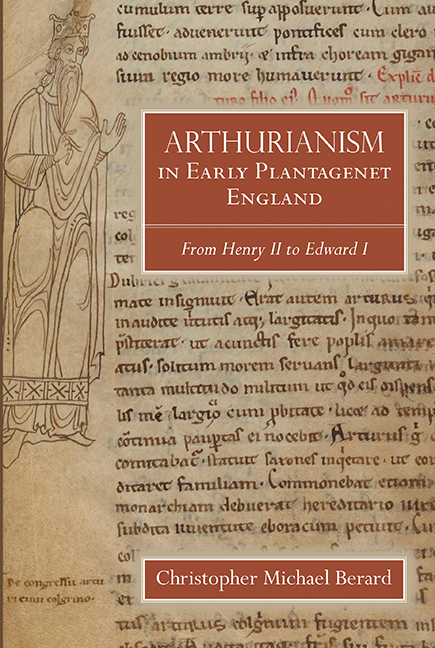Book contents
- Frontmatter
- Contents
- List of abbreviations
- Genealogical Table of the Sovereigns of England from William I to Edward II
- Introduction
- 1 Arthurianism during the reign of Henry II, 1154–1189
- 2 Arthurianism during the reign of Richard I, 1189–1199
- 3 Arthurianism during the reign of King John, 1199–1216
- 4 Arthurianism during the reign of Henry III, 1216–1272
- 5 Arthurianism during the reign of Edward I, 1272–1307
- Conclusion
- Bibliography
- Acknowledgments
- Index
- Miscellaneous Frontmatter
5 - Arthurianism during the reign of Edward I, 1272–1307
Published online by Cambridge University Press: 25 March 2020
- Frontmatter
- Contents
- List of abbreviations
- Genealogical Table of the Sovereigns of England from William I to Edward II
- Introduction
- 1 Arthurianism during the reign of Henry II, 1154–1189
- 2 Arthurianism during the reign of Richard I, 1189–1199
- 3 Arthurianism during the reign of King John, 1199–1216
- 4 Arthurianism during the reign of Henry III, 1216–1272
- 5 Arthurianism during the reign of Edward I, 1272–1307
- Conclusion
- Bibliography
- Acknowledgments
- Index
- Miscellaneous Frontmatter
Summary
Arthurus redivivus: for business or for pleasure
The author of the Chronicle of Lanercost (to 1297) concludes his discussion of the murder of Arthur of Brittany, the ‘verus heres Angliæ’ (the true heir of England), with a vignette involving Henry III and Arthur's elder sister, Eleanor of Brittany. This encounter would have taken place within two years of her death (10 August 1241). The chronicler writes:
Dicitur tamen quod rex Henricus, filius ejusdem Johannis, ante mortem suam, credens se non omnino juste regnare, obtulit dictæ dominæ Alienoræ, sorori Arthuri, coronam regni Angliæ, et resignavit ei totum jus quod habebat in regno, et illa recepit et tenuit per tres dies. Postea fecit dominum Henricum vocari et dixit ei, ‘filius tuus Edwardus est valens juvenis et strenuus; ego concedo sibi totum jus meum.’
(It is said that King Henry, the son of the same John, before her death, believing that he was not reigning altogether justly, offered the crown of the realm of England to the said Lady Eleanor, sister of Arthur, and he resigned to her all the right that he held in the realm, and she received it and held it for three days. After that she had Lord Henry summoned and said to him: ‘Your son Edward is a valiant and hardy youth. I concede to him all my right.’)
The author of this segment is believed to have been active from 1280 to 1297 – well into the reign of Edward I (1272–1307) and for a good forty years after the recounted event. It should be noted, however, that the chronicler speaks of Eleanor's death as having happened ‘in hac nostra ætate’ (in this our age). The factuality of the narrative is wholly undermined by the fact that Edward was only two years old at the time of Eleanor's death. He would not have been a valens juvenis et strenuus, but a mere infans. This vignette, however, is of the utmost relevance to our topic. It was surely devised during the reign of Edward I, almost certainly by one of the king's supporters.
- Type
- Chapter
- Information
- Arthurianism in Early Plantagenet EnglandFrom Henry II to Edward I, pp. 215 - 300Publisher: Boydell & BrewerPrint publication year: 2019



